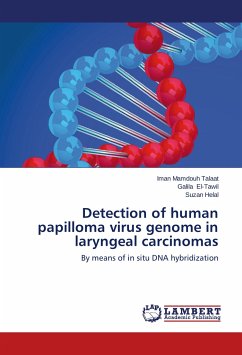Human papilloma viruses (HPV) have been implicated in the genesis of several human cancers, including squamous tumors of the upper respiratory tract. Although it is known that tobacco and alcohol are the main causal agents, epidemiologic and molecular studies have suggested a role for HPV infection in the pathogenesis of laryngeal tumors. Despite the large number of reports about HPV prevalence in these anatomical regions, the role of HPV in the development of squamous cell carcinoma of the larynx is poorly understood. In benign lesions caused by HPV, viral DNA is located extrachromosomally in the nuclei of infected cells, it remains episomal (free) whereas it is integrated into host chromosomal DNA in malignant cells. Various techniques exist for the detection and typing of HPV DNA. They are all based on demonstration, under controlled conditions, of the ability of the nucleic acid being tested to reassociate with a probe. Recently, the in situ hybridization technique (ISH) and the polymerase chain reaction (PCR) are the methods of choice.
Bitte wählen Sie Ihr Anliegen aus.
Rechnungen
Retourenschein anfordern
Bestellstatus
Storno








